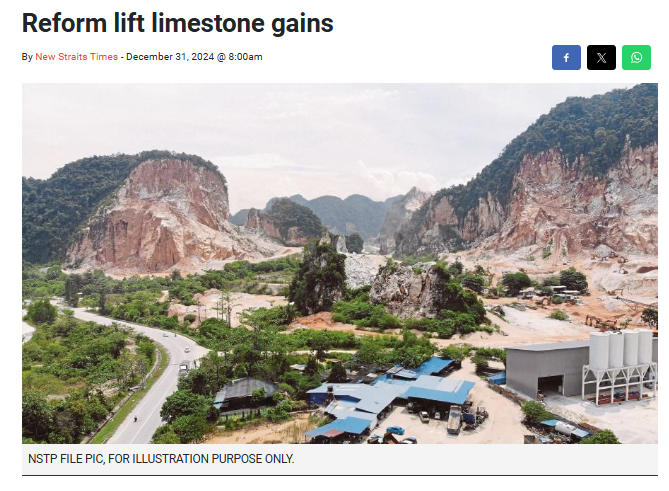
KUALA LUMPUR: A public-private sector-led regulatory experimentation in the limestone industry has reshaped its business landscape, slashing licence approval times, reducing redundant paperwork and increasing exports.
The project has generated a 50 per cent reduction in administrative workload and more than 60 per cent faster processing times, increasing the industry's productivity by 200 per cent.
Correspondingly, the value of limestone exports is estimated to surge by 50 per cent to RM6 million this year.
These gains spotlight Malaysia's ability to respond swiftly to evolving global demand, reinforcing the country's potential as a dominant force in international minerals' trade.
At its core is the symbiotic cooperation between the federal and Perak governments, which streamlined regulatory efficiency with regard to the limestone export licence.
The regulatory experimentation is spearheaded by the Malaysia Productivity Corporation (MPC), The Special Task Force to Facilitate Business (Pemudah) and the Chemical Productivity Nexus (CPN), with strong support from the Perak government, state Land and Mines Office, the Mineral and Geoscience Division under the Natural Resources and Environmental Sustainability Ministry, the Mineral and Geoscience Department and major industry stakeholders. It focused on extending the validity of the limestone export licence from six to 12 months, synchronising concurrent submissions at the state Land and Mines Office and eBMG, and reducing processing time.
The project achieved its objectives and Pemudah has endorsed the 12-month licence validity for the export of limestone products.
Industry players welcome the initiative and praise the joint federal-state effort to reduce regulatory burdens on businesses in the limestone industry.
Cutting the approval-processing time for a limestone export licence to two months from six months minimises disruptions to business operations. Industry players manage costs and the use of resources better and are more productive. The simultaneous submissions, for instance, reduce companies' workload for repetitive tasks and in-person verification.
STRATEGIC ASSET FOR INDUSTRIAL ADVANCEMENT
Malaysia's extensive high-grade deposits underlie a thriving lime industry buoyed by growing worldwide demand for lime-based products.
Malaysia consistently ranks among Asia's top lime exporters, leveraging strategic shipping routes, strong trade networks and diversified export partnerships stretching across India, Japan, Indonesia, Singapore and Taiwan.
The surging demand in Asia's dynamic economies, driven by civil infrastructure expansion and numerous manufacturing processes spanning paper, paint, plastics, rubber, glass and steel, underscores the heightened relevance of Malaysian lime on the global stage.
Perak is the foremost contributor to limestone production in Malaysia, owing to abundant reserves widely prized for high calcium carbonate content and low impurity levels.
The state's dependable transport infrastructure lowers logistical costs and expedites deliveries from quarry sites to processing facilities. Refined lime is important in agriculture, construction, and environmental stewardship.
This multifaceted utility cements lime's importance as a driver of socio-economic and ecological wellbeing.
Limestone exports constitute a relatively small yet stable fraction of Malaysia's total exports, providing steady foreign exchange earnings.
In recent years, demand has been consistent, in line with regional construction booms and industrial development.
The industry's contribution to Malaysia's export strategy remains significant, supporting diversification and resilience, and downstream industries.
CONFRONTING REGULATORY COMPLEXITIES
The limestone and lime industry has long grappled with protracted approval systems at the federal and state levels.
Complex, multi-layered processes dampen business enthusiasm. They hinder expansion and businesses' ability to predict operational timelines.
The Natural Resources and Environmental Sustainability Ministry reported that limestone export approvals rose by 6.79 million metric tonnes in 2022, climbing to 8.17 million metric tonnes in 2023. This indicates that the industry has consistently shown resilience despite global economic headwinds.
Burdensome red tape continues to cause uncertainty, potentially diverting capital to more streamlined markets. Without decisive intervention, the limestone industry's capacity for innovation and economic contribution risks stagnating.
ALIGNING LICENCE VALIDITY WITH APPROVAL TIMELINES
The discrepancy between the six-month licence validity and an end-to-end approval cycle often spanning four to six months or more poses a challenge to limestone industry players to operate productively.
The mismatch compresses exporters' viable operating windows and triggers repeat applications before existing licences can be fully exploited.
The consequent paperwork, delays and re-applications siphon resources away from productivity, expansion and strategic pursuits.
Over time, persistent delays may discourage new entrants or prompt existing players to divert investments elsewhere.
Remedying this quandary hinges on adjusting regulatory frameworks by extending licence validity to match approval durations and expediting critical administrative procedures.
Implementing these measures alleviates repetitive submissions, lowers operational costs and frees up public-sector resources for higher-impact endeavours.
CPN champion Datuk Dr Mohamed Noor Sany, who is among key individuals in realising the regulatory experimentation, said extensive consultations were done with relevant stakeholders in designing the solution to expedite
the limestone export licence approval.
"Once all parties agreed, we tested the solution to evaluate its feasibility and effectiveness. I am glad all parties did their best to realise the regulatory experimentation. Scaling up the model in other states will have a huge impact on limestone exports, the movement of minerals, and the industry itself."
SUSTAINING MOMENTUM FOR PRODUCTIVITY, COMPETITIVENESS
MPC exemplifies how incisive reforms can spark far-reaching transformation.
When amplified to other locations, the small-scale experiment in Perak will spur investment and economic activities. The modernised regulatory framework ensures businesses gain their productivity and competitive edge.
MPC's confidence in regulatory experimentation underscores the power of deliberate, evidence-based policy shifts.
By adopting proven strategies nationwide, the government and the private sector can unlock new realms of innovation and collaboration, previously stifled by bureaucratic inertia.
Continued cooperation among key governmental bodies and industry stakeholders remains vital, ensuring Malaysia's limestone industry thrives domestically and emerges as a formidable force in the global minerals market — renowned for its prescience, reliability and resilience.


